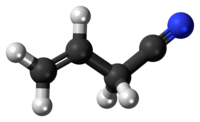
Photo from wikipedia
Simple Summary Physiological changes to the body can affect the brain. For example, inflammation that originates in the body can be sensed by the brain. In this study, we used… Click to show full abstract
Simple Summary Physiological changes to the body can affect the brain. For example, inflammation that originates in the body can be sensed by the brain. In this study, we used an agent called resiquimod (R848) to stimulate inflammation in the periphery and measured structural and metabolic brain responses in anesthetized mice using in vivo magnetic resonance imaging. Relative to baseline prior to drug administration, a high dose of R848 caused sickness behaviors and volume expansion in several cortical regions at 3 h that were no longer evident at 24 h. Transient volume expansion in response to peripheral immune stimulation is consistent with brain swelling. Abstract Peripheral administration of the E. coli endotoxin lipopolysaccharide (LPS) to rats promotes secretion of pro-inflammatory cytokines and in previous studies was associated with transient enlargement of cortical volumes. Here, resiquimod (R848) was administered to mice to stimulate peripheral immune activation, and the effects on brain volumes and neurometabolites determined. After baseline scans, 24 male, wild-type C57BL mice were triaged into three groups including R848 at low (50 μg) and high (100 μg) doses and saline controls. Animals were scanned again at 3 h and 24 h following treatment. Sickness indices of elevated temperature and body weight loss were observed in all R848 animals. Animals that received 50 μg R848 exhibited decreases in hippocampal N-acetylaspartate and phosphocreatine at the 3 h time point that returned to baseline levels at 24 h. Animals that received the 100 μg R848 dose demonstrated transient, localized, volume expansion (~5%) detectable at 3 h in motor, somatosensory, and olfactory cortices; and pons. A metabolic response evident at the lower dose and a volumetric change at the higher dose suggests a temporal evolution of the effect wherein the neurochemical change is demonstrable earlier than neurostructural change. Transient volume expansion in response to peripheral immune stimulation corresponds with previous results and is consistent with brain swelling that may reflect CNS edema.
Journal Title: Biology
Year Published: 2022
Link to full text (if available)
Share on Social Media: Sign Up to like & get
recommendations!